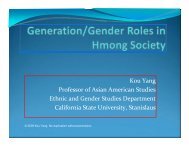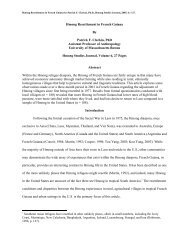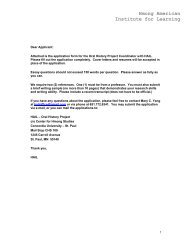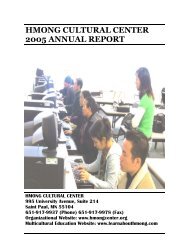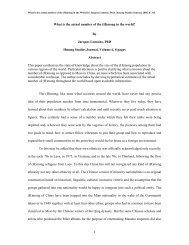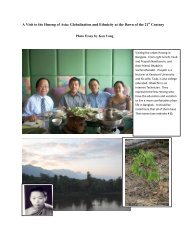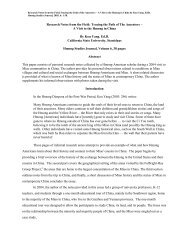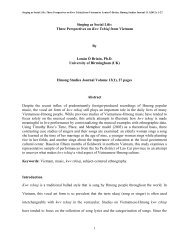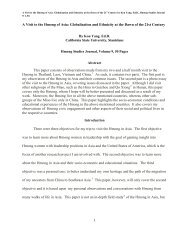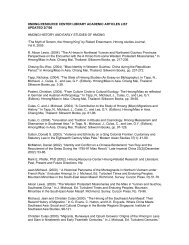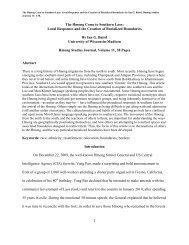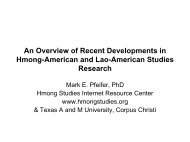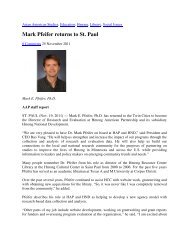Hmong and Lao Refugee Women - Hmong Studies Internet ...
Hmong and Lao Refugee Women - Hmong Studies Internet ...
Hmong and Lao Refugee Women - Hmong Studies Internet ...
You also want an ePaper? Increase the reach of your titles
YUMPU automatically turns print PDFs into web optimized ePapers that Google loves.
<strong>Hmong</strong> <strong>and</strong> <strong>Lao</strong> <strong>Refugee</strong> <strong>Women</strong>: Reflections of a <strong>Hmong</strong>-American Woman Anthropologist by Dia Cha, Ph.D. <strong>Hmong</strong> <strong>Studies</strong> Journal,<br />
2005, 6: 1-35.<br />
according to UNHCR regulations, these woman should have been granted the sort of legitimate change of<br />
status which would have allowed them to decline this repatriation.<br />
The author, accordingly, spoke to a UNHCR case worker in the matter, <strong>and</strong> it was discovered that<br />
important documents were missing from the files of the three women concerned. The case worker, in<br />
consequence, suggested that the documents, detailing the circumstances of the arrest of husb<strong>and</strong>s in <strong>Lao</strong>s,<br />
should be submitted to the UNHCR branch office in Bangkok. This was done, <strong>and</strong> the documents were<br />
duly submitted with a letter requesting a review of the case. In addition, a transcription of the interview<br />
between the three women <strong>and</strong> the author was included in the packet. Two weeks after the author's<br />
departure from Napho camp, the women's cases were reviewed. Subsequently, too, rumors of the episode<br />
spread quickly. In the event, many asylum seekers – who had already been screened out of eligibility –<br />
went to the UNHCR office in the camp <strong>and</strong> requested that their cases, too, be reviewed.<br />
As may be imagined, this created something of a dilemma for UNHCR, <strong>and</strong> several UNHCR<br />
officials became quite incensed at the author's involvement. The author had, so it was said, exceeded<br />
research dem<strong>and</strong>s to become a refugee advocate, <strong>and</strong> the screening process – a highly politicized affair –<br />
should have been considered by her as being "off limits." The fallout from this awkward development<br />
was not without its adverse aspect, for, when the author returned from a trip to <strong>Lao</strong>s expecting to travel to<br />
the refugee camp at Chieng Kham, the office of UNHCR in Bangkok refused to grant a camp pass. The<br />
author was thereafter barred from any further visits to Chieng Kham. 15<br />
This incident is instructive, touching, as it does, on the nature of the boundary between scholarly<br />
interviewer, friend, <strong>and</strong> legal advocate – a boundary much considered in the body of the article, above. In<br />
an examination of the incident, the question must be asked, "Where does one draw the line, <strong>and</strong> what<br />
might have been done differently in order to avoid this situation, so uncomfortable for all concerned?"<br />
Many alternatives suggest themselves, none entirely satisfactory. In retrospect, however, the actions<br />
15 It seemed, after this incident, that UNHCR would never again allow access to the camps where this research<br />
project had been conducted. However, during a subsequent visit to Thail<strong>and</strong> to present research findings at a related<br />
conference, a director of one of the UNHCR offices in Napho camp offered permission to return after graduation – a<br />
considerable surprise.<br />
32



